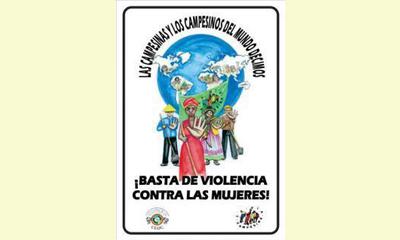|
|
MPP’s Much Ado About Women
un articulo por Mina Remy, Grassroots International (abridged and reprinted by permission)
Haiti, like everywhere else, has a complex relationship with women. Women’s work in and out the home is invaluable, sometimes the difference between: eating or not, schooling or not, and medical care or not. The majority of Haitian households are headed by women who are divorced, widowed, or never married. These women are eking out a living by the skin of their teeth—resourceful in a resource-strapped world. But despite Haitian women’s contributions to society and economy, they remain trapped invarious levels of social and institutional discrimination. They face barriers to adequate housing, education, employment, and justice. . . .

click on photo to enlarge
It’s within this context that Grassroots International partner, the Peasant Movement of Papaye (MPP), identified structural violence as an impediment to women’s participation in the movement more than 30 years ago. While MPP’s work is inspiring across the board—reforestation through agroecology, providing farmers with extension services, and building eco-villages for people displaced by the 2010 earthquake—what fascinated me the most during my visit with them this year is their long-term commitment to parity for women in the movement specifically, and Haiti more broadly. . .
For MPP the choice was clear. The organization could either encourage women to meet clandestinely (and risk retaliation in the form of physical violence) or embark on a public education campaign to convince entire communities of the value of women’s participation. MPP chose the latter through a simple approach: if families want to improve their lot as farmers then everyone engaged in farming need the training and support offered by MPP . . .
Over the years, MPP has educated hundreds of young women from primary school to university. (It has also provided basic literacy training to adult women.) Nothing convinced rural families of the value of their girls, and their education, more than the success of MPP’s new cadre of educated young women. Rather than hold their girls back, families became zealous advocates. MPP’s young women have attended university nationally, regionally, and internationally. Many are trained in medicine, agronomy, management, and information technology to name a few . . .
As I walked the through paths and agroecological gardens of MPP’s Centre Lakay, their training center, I met many women and young women working in the movement as agronomists, information technologists, planners, managers, and trainers. While the MPP is extremely close to achieving 50/50 parity in the movement, it’s not satisfied. It remains committed to ending structural violence against women in the movement, rural communities and Haiti. Ghislaine, MPP’s co-spokesperson, told me with confidence that MPP understands that “A movement that doesn’t include women is incomplete and cannot succeed.”
[Note: Thank you to Janet Hudgins, the CPNN reporter for this article.]
|








|
DISCUSSION
Pregunta(s) relacionada(s) al artículo :
Do women have a special role to play in the peace movement?,
* * * * *
Comentario más reciente:
:
The 30 articles in CPNN linked to this question make it clear that women indeed have a special role to play in the peace movement. See the following for an historical explanation of why this is true.

|
|









